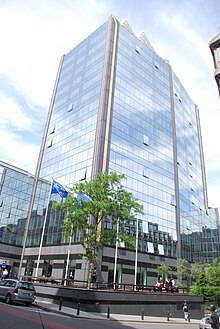Court finds UK allowed undervalued Chinese imports into EU
Friday, March 11, 2022
Image: Luxofluxo.

Image: Matthias v.d. Elbe.

Image: Lkjidm.
The European Court of Justice (ECJ) ruled on Tuesday the United Kingdom neglected its obligations as a former European Union member by allowing "undervalued imports of textiles and footwear from China" to enter EU markets.
The European Commission argued HM Revenue and Customs "failed to fulfil its obligations" under EU law by collecting insufficient customs duty and value-added tax payments for Chinese clothes and shoes imports from 2011-17. In 2017, over half of such products were found by the European Anti-Fraud Office (OLAF) to be imported below "the lowest acceptable prices".
The lowest acceptable prices are a risk assessment tool introduced by OLAF to detect "imports presenting a significant risk of undervaluation". OLAF informed member states of the chance for "extreme undervaluation" by shell companies, including during bilateral meetings with the UK over 2015 and 2016. Despite this, the ECJ found British authorities did not utilise the metric for its monitoring operations in 2011 and 2014.
As a result, it did not conduct "appropriate customs controls", allowing the products "free circulation in the internal market". As an example, fraud investigators in 2017 found women's trousers from China were declared at €0.91 per kilogram, €0.53 below the market price for cotton. The Commission estimates this cost the EU budget €2.68 billion (~$2.9 billion) from 2011-17, as 80% of customs duties go toward funding the EU's budget.
However, the ECJ denied the Commission's request the UK provide such a sum as repayment, citing inconsistencies with its full amount calculations which meant it had not met the "requisite legal standard". The UK remains under ECJ jurisdiction for infractions made during its EU membership even after leaving the EU in January 2020. The UK was ordered to pay four-fifths of legal costs Brussels incurred since OLAF first alleged misconduct in 2017.
The UK can challenge the fine, but not the result from the judgment. The fine amount €2.68 billion is up from the original €1.99 billion in lost duties uncovered from a sophisticated fraud ring. However, while today's sum was taken from 2011-17, the investigation initially focused on evidence from 2013-16 in the ports of Felixstowe and Dover, England.
At the time, a representative for then-Prime Minister Theresa May said the sum was "not a bill. It's an estimate" and "we don't recognise the figures."
The Luxembourg-based court concluded the British government failed "to apply effective customs control measures or to enter in the accounts the correct amounts of customs duties". It added the "inadequate nature of the checks carried out by the United Kingdom customs authorities" allowed fraudulent shell companies to move their operations to the UK.
The ECJ concluded the UK had also failed "to provide the Commission with all the information necessary" to make its own calculations.
The UK remained opposed to the EU's methods against calculating undervalued goods, and was supported in doing so by Belgium, Estonia, Greece, Latvia, Portugal and Slovakia. Of them, Portugal, Slovakia and the UK, as well as Malta and Spain, were found to have "major undervaluation hubs" in the first month of OLAF's 2014 Operation Snake.
British ports, specifically Dover, were found to be the main entry points for Chinese goods before clearing European customs and being trafficked across the continent. Bruno Collin, head of a French anti-fraud operation in 2016, lamented to Politico Europe the unhelpfulness of British authorities. He said only "extremely vague answers" were given to French requests, if they responded at all.
When OLAF first reported on the UK's "continuous negligence" to combat fraud, HM Revenue told Politico Europe it boasted an "excellent record in tackling fraud and rule breaking of all kinds". Collin, however, concluded: "They don't make an effort."
Sources
- Press Release: "Judgment in Case C-213/19" — Court of Justice of the European Union, March 8, 2022 (PDF)
- Andrew Woodcock. "UK 'failed' by letting cheap Chinese clothes flood EU market" — The Independent, March 8, 2022
- Jennifer Rankin, Daniel Boffey. "UK faces large EU bill over Chinese imports fraud" — The Guardian, March 8, 2022
- "EU court rules against UK over multibillion-euro customs fraud" — Reuters, March 8, 2022
- Giulia Paravicini. "UK faces €2 billion EU tab for China fraud" — Politico Europe, March 8, 2017
- Jennifer Rankin. "UK faces €2bn fine over Chinese imports scam, say EU investigators" — The Guardian, March 8, 2017
